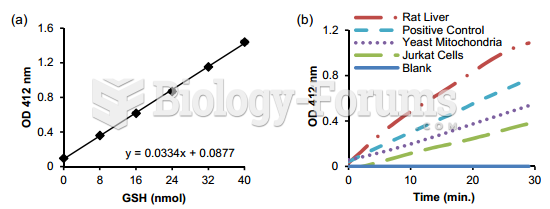|
|
|
Cytomegalovirus affects nearly the same amount of newborns every year as Down syndrome.
As many as 20% of Americans have been infected by the fungus known as Histoplasmosis. While most people are asymptomatic or only have slight symptoms, infection can progress to a rapid and potentially fatal superinfection.
As of mid-2016, 18.2 million people were receiving advanced retroviral therapy (ART) worldwide. This represents between 43–50% of the 34–39.8 million people living with HIV.
The average older adult in the United States takes five prescription drugs per day. Half of these drugs contain a sedative. Alcohol should therefore be avoided by most senior citizens because of the dangerous interactions between alcohol and sedatives.
The lipid bilayer is made of phospholipids. They are arranged in a double layer because one of their ends is attracted to water while the other is repelled by water.
 (a) Mean duration (days) and (b) average maximum depth (mm) of snow cover throughout northern latitu
(a) Mean duration (days) and (b) average maximum depth (mm) of snow cover throughout northern latitu
 In this painting evangelist George Whitefield appears to be cross-eyed. This is no fault of John Wol
In this painting evangelist George Whitefield appears to be cross-eyed. This is no fault of John Wol





